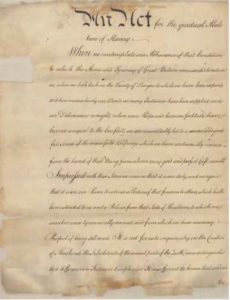
*An Act for the Gradual Abolition of Slavery passed on this date in 1780. Approved by the Fifth Pennsylvania General Assembly, it prescribed an end to slavery in Pennsylvania.
It was the first Act abolishing American slavery in human history to be adopted by a democracy. The Act prohibited further importation of enslaved people into the state. It required Pennsylvania slaveholders to register their slaves annually. They would endure forfeiture for noncompliance and manumission for the enslaved if they didn't. It established that all children born in Pennsylvania were free persons regardless of the condition or race of their parents. Before the 1780 law came into effect, those enslaved in Pennsylvania remained enslaved for life.
The 1780 Act prohibited further importation of enslaved people into Pennsylvania, but it also respected the property rights of Pennsylvania slaveholders by not freeing enslaved people already held in the state. It changed the legal status of future children born to enslaved Pennsylvania mothers from "slave" to "indentured servant" but required those children to work for the mother's master until age 28. The Act created a registry of all enslaved people in the state to verify that no additional enslaved people were imported. Slaveholders who failed to register their slaves or did it improperly lost their slaves to manumission.
The 1780 Act specifically exempted members of the U.S. Congress and their slaves. Congress was then the only branch of the federal government under the Articles of Confederation and met in Philadelphia. Other slaveholding officers of the executive and judicial branches faced a similar dilemma. Secretary of State Thomas Jefferson swore that he would eventually free his enslaved cook, James Hemings, if Hemings agreed not to take advantage of Pennsylvania's abolition law.
Philadelphia's hostile environment for slaveholders was one reason the Constitution was written to give Congress exclusive control "over such District... as may... become the seat of the government of the United States." Pennsylvania's "gradual abolition" rather than Massachusetts's 1783 "instant abolition" became a model for freeing enslaved people in other Northern states. Aftermath Those enslaved in Pennsylvania before its 1780 Act became law continued to be lifelong enslaved people unless manumitted.
Also, the 1780 Act and its 1788 Amendment did not apply to fugitive slaves from other states or their children. Pennsylvania tried to extend rights to fugitive slaves through an 1826 personal liberty law, but it and the 1788 Amendment were ruled unconstitutional by the U.S. Supreme Court in Prigg v. Pennsylvania (1842). Although slavery steadily declined in Pennsylvania, the state initially led the way toward abolition and tolerated it for decades after it ended in Massachusetts. The 1840 U.S. Census listed 47,854 (99.87%) of the state's blacks as free and 64 (0.13%) as enslaved people.